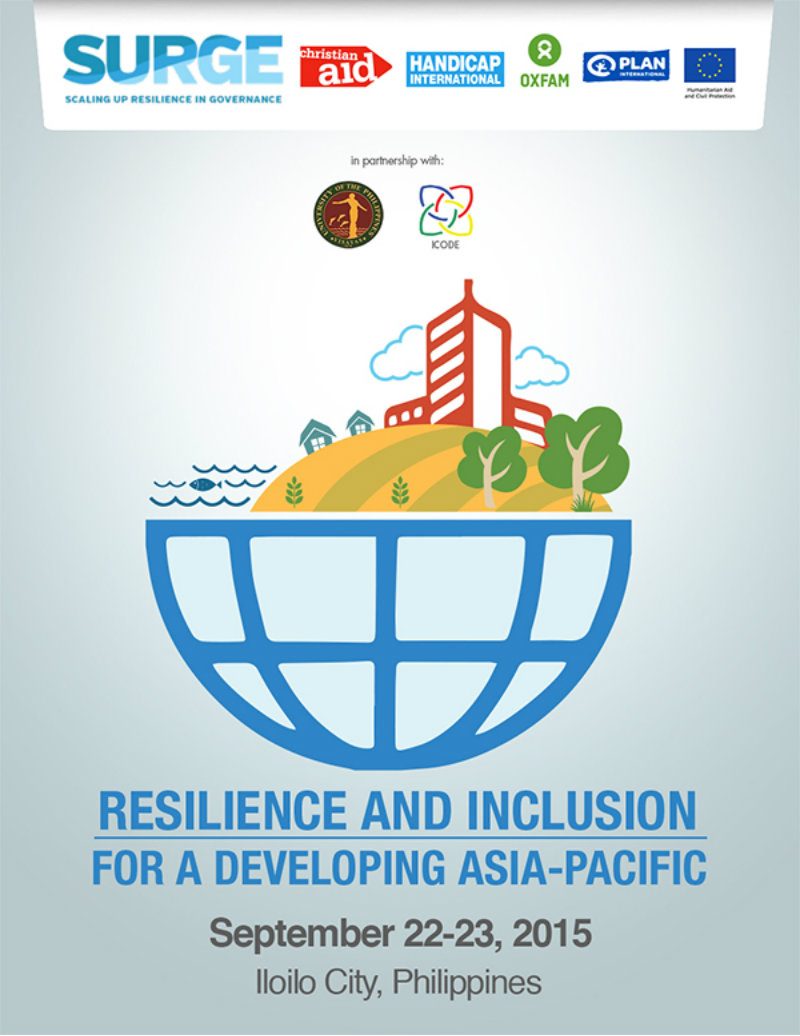SUMMARY
This is AI generated summarization, which may have errors. For context, always refer to the full article.

This is a press release from SURGE.
ILOILO, Philippines – A two-day event is being organized in Iloilo City by a consortium of civil society organizations in time for the Asia-Pacific Economic Cooperation (APEC) meeting of Senior Disaster Officials on September 22-23, 2015.
The two-day event dubbed as “Resilience and Inclusion for a Developing Asia-Pacific” is being organized by Christian Aid, Handicap International, Oxfam and Plan International in partnership with the University of the Philippines-Visayas and the Iloilo Caucus of Development NGOs (Iloilo CODE-NGOs) with a forum, panel discussion, workshop and exhibit at Avana Filipino Bistro in Iloilo City.
The event will start with a context presentation by Jessica Dator-Bercilla, a senior advocacy and policy officer of Christian Aid Asia and the Middle East, who will tackle Resilience and Inclusivity in Sustainable Development within the context of the recently concluded Sendai Framework on Disaster Risk Reduction, Sustainable Development Goals and the United Nations Framework on Climate Change.
A keynote address is expected to be delivered by an official from an APEC member economy.
Among the main panelists who are confirmed to attend are Dr. Poh Poh Wong from the National University of Singapore and Dr. Rosa Perez, Fellow of the Manila Observatory and climate specialist of the Asian Development Bank.
Also among the panelists who will provide perspectives from the government are Director General Arsenio Balisacan of the National Economic Development Authority (NEDA) and Province of Albay Governor Joey Salceda. They will be joined by officials from the Provincial and City governments of Iloilo.
There will also be a panel discussion on the perspectives from private sector, the academe and the experiences gathered by civil society organizations.
Among the topics that will be tackled by a panel of presenters are the following:
- Challenges of the New Normal to Small Islands in Asia Pacific
- How Resilience Can Lead to Development
- Why We Need to Scale Up Resilience in Governance
- How can we make the work in resilience more inclusive
The presentations will be followed by workshops which will focus on key elements for a resilient, inclusive and sustainable development and what can we do with what we have.
The event is significant not only for APEC member economies but as also for the SURGE Project and its partners as they gear up for this year’s sunset review of Republic Act No. 10121 or the Philippine Disaster Risk Reduction and Management Act of 2010.
The Iloilo City gathering is also important for it comes at the heels of the recently concluded Sendai Conference wherein the goals and objectives of disaster risk reduction were laid down.
By holding the event in time for the APEC Senior Disaster Officials meeting, the CSO consortium is looking forward to attain the following:
- Highlighted the lessons and successes form experiences on Inclusive Community Based Disaster Risk Reduction (ICBDRR) from the different communities across the Philippines, particularly from the geographically isolated and from the vulnerable sectors;
- Explored ways in engaging with the regional platform for advocacy of ICBDRR as a support to the national and sub-national advocacy efforts; and,
- Registered perspectives of communities and CSO on the ongoing narrative of disaster management in the Asia-Pacific region.
The two-day event will be concluded by the launching of the enhanced module on Inclusive Community Based Disaster Risk Reduction (ICBDRR).
About the SURGE project
The SURGE Project was initiated by a consortium of civil society organization with the goal of increasing resilience of high-risk communities in the Philippines and extends inclusive community-based disaster risk reduction management policies and practices.
The project also intends to scale up good practices and models on inclusive community-based disaster risk reduction implemented in many communities and barangays over the years. Through the project, the CSO consortium hopes to bring successful experiences and good practices to more communities.
The 18 month project commenced March 2014 and will end September 2015 and it is funded by the European Commission’s Humanitarian Aid under its Disaster Preparedness Program (DIPECHO).– Rappler.com
Add a comment
How does this make you feel?
There are no comments yet. Add your comment to start the conversation.